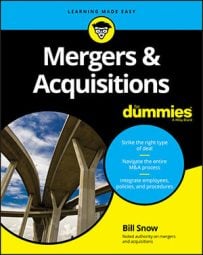Moving forward with an M&A deal means that both sides sign a letter of intent (LOI). Although the LOI is an important step, rushing and carelessly signing an LOI without fully understanding it can create plenty of problems. To help you avoid problems and increase the odds of a successful closing, this presents four issues to consider before signing an LOI.
Is the deal too good to be true?
This caution is especially true for Sellers. That great deal that Buyer is dangling may be nothing more than a Trojan horse, a ruse to lock up you, the Seller, with exclusivity for a period of time before coming back with a lower price after you’ve been out of the market and are therefore in a weaker position.
Even if Buyer isn’t trying to pull a fast one, he may not be able to line up the capital needed to actually close the deal he’s offering.
As a Seller, you need to be brutally honest with yourself about your company’s value. Frankly, an experienced advisor can be a huge help here. Does the company really warrant the high price Buyer is offering?
How is the buyer financing the deal?
Does Buyer have the cash, is she planning to tap a bank line, or is she asking Seller to help with the financing? Does Buyer already have access to sources with cash, or is she planning to shop for investors after signing the LOI?
As a Seller, carefully vet potential Buyers and their fund sources. If Buyer is private and is unwilling to share financials, ask for a letter from her bank stating that the bank supports her acquisition plan.
How much cash is in the offer?
A great offer with a high valuation may not be what it initially seems to be. Does Buyer pay 100 percent of the proceeds at closing? Is any hold back or any sort of contingent payment (such as notes or earn-outs) involved? Is stock part of the offering price? In other words, does Seller have to jump through hoops to get his money?
Weigh all the merits of each deal and not just the valuation number; an offer with a lower deal value but all cash at closing may be a better deal than a higher valuation comprised of contingent payments, because the former may be more likely to result in your being paid in full.
Is the deal a stock or asset deal?
The age-old issue in M&A is the stock deal versus the asset deal. Sellers usually prefer stock deals because of preferential tax treatments. Buyers usually prefer asset deals because those deals lower Buyers’ risks of successor liabilities (legal problems for Buyer as a result of issues that occurred before the company was sold).
Frankly, perhaps the better question here is, “Does the deal type even make much difference to you?” Depending on variables far too numerous and disparate to recount here, Seller’s specific tax situation may mean the difference between the tax consequences of a stock deal and those of an asset deal is negligible. And Buyers may not really need an asset deal.
If the reps and warranties are strong enough, the successor liabilities issue may not be as large as it seems.
Both Buyers and Sellers should speak with their attorneys about the specific deal at hand and their specific situations when determining what type of deal to accept.

